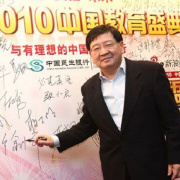

|
Renmin University, one of China's top universities, recently announced an independent recruitment plan for undergraduate students. However, the plan, "project to realize a dream", under which it intends to enroll rural students whose families produced no college graduates in the past three generations, has caused quite a controversy in China. Although the recruitment plan, which is similar to the admissions process of Western colleges and universities, would only cover 5 percent of total enrollment, some critics said that it is simply reverse discrimination. But others lauded the university's plan, regarding it as a bold move to address the widening inequality in education. |

|
It's far from enough to push through equal education rights just by the independent recruitment channel. We need a nationwide institutional re-arrangement. In fact, it's already too late to pursue education equality at the tertiary education stage. Education equality starts at the very outset: we should put equal, if not more, emphasis on education rights during the primary and secondary education periods, taking affirmative actions for rural students, if necessary. |
|
We should undoubtedly see the positive side of Renmin University's effort to open this "special channel" for rural students with excellent academic achievements. We should also endorse this and other similar attempts. The only issue I take with it is the way it is done. In a nutshell, "to realize a dream" means we need more equality rather than benefits. |
|
Bravo! I think people of all circles should support rural areas and farmers. I believe that a college student who comes from a rural area will definitely change his family's fate and can also influence many of those who live around him or simply read his story. It will greatly help narrow the urban-rural gap. |
|
Good education and equal access to education won't be easily achieved by an independent recruitment process. We must start to stress equity in primary schools, or even in kindergartens. Meanwhile, we don't expect to see that when one form of unfairness is tackled, another comes along. The "self-improvement plan" of Tsinghua University and the "project to realize your dream" of Renmin University are worthwhile experiments. But what we need more is a nationwide reform of the education system |
|
It is quite normal that it gives rise to controversy. But I personally support this plan. It is not a bad thing to have a college student in the family, and wouldn't it be better to give priority to high school graduates who have had no family members attend college in the last three generations? The program, which is badly needed in society, helps the disadvantaged gain a little more advantage. If policymakers can always keep those hopeless people in mind during their decision-making, they will have hope! |
|
Those who are against the program should learn more facts. Independent recruitment accounts for only 5% of the whole recruitment plan, while "the project to realize a dream" is just a small part of the independent recruitment plan. Is there any fault with a plan that is intended to encourage students from the bottom rungs of society, and help those who have neither the economic capital, nor the power or knowledge capital, realize their dream to attend a famous university? |

| The debate is still raging on this specific enrollment policy and what it might entail, but even the most vocal critics would have to admit that China is now facing a widening urban and rural gap not only in education, but also in a host of other socio-economic areas. While they might be correct to point out the ineffectiveness, or even the absurdities, of the plan to close the gap, there is also no doubt that we urgently need to find that bridge or bridges, before it's too late. |
 @Xinjingjing Weibo User
@Xinjingjing Weibo User  @Xue Hongwei Weibo User
@Xue Hongwei Weibo User @Fanhongtao, Editor-in-Chief, Wuhan Morning News
@Fanhongtao, Editor-in-Chief, Wuhan Morning News @Jiulongshihai, Director, Nanjing Xuzhuang Software Park
@Jiulongshihai, Director, Nanjing Xuzhuang Software Park  @ Xuxiaoping, Co-founder, New Oriental Education & Technology Group
@ Xuxiaoping, Co-founder, New Oriental Education & Technology Group  @Pony 0711, Sina Weibo User
@Pony 0711, Sina Weibo User